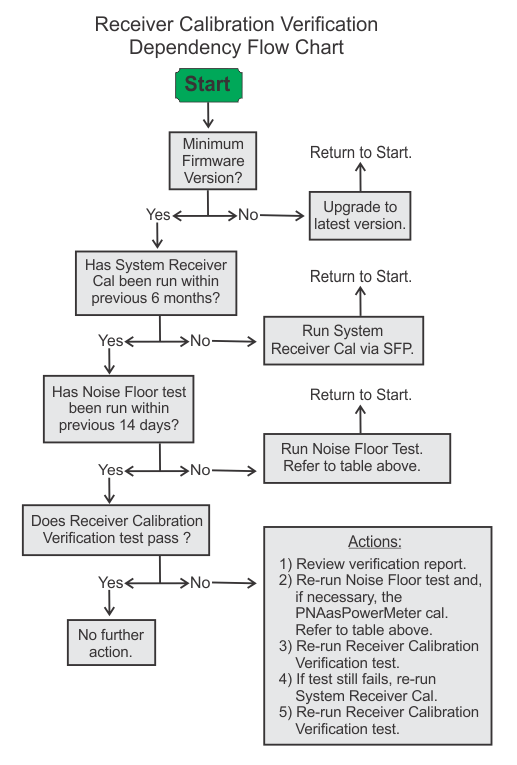
This test verifies the existence and the accuracy of the receiver correction data stored in the VNA. The receiver correction data is generated by the System Receiver Cal through the soft front-panel (SFP) of the VNA.
This test compares the receiver correction data stored in the DUT with the correction data generated from the Noise Floor Performance Test. If the difference between them is greater than the test limit, this test will have a fail result.
The following conditions will be checked at the beginning of the test process. The test will abort immediately if any of them is true:
If the Noise Floor Performance Test has not been run within the previous 14 days.
If there is no receiver correction data stored in the DUT or the data was generated more than 6 months ago.
The table and flow chart below provide details of the test dependencies and how they affect the test process.
|
Dependency |
Expiration Interval |
Summary |
|
VNA firmware version check |
none |
This test requires VNA firmware versions:
Note that the P937xA USB VNA firmware is the recommended VNA firmware version for running the N7874A Calibration Application. The P937xA USB firmware can be used for both types of VNA DUTs: USB and PXIe. TME will check for the firmware version at order creation and, if necessary, prompt the user to update the firmware to the latest version. For PXIe models, if the order is created without the required firmware revision, then this test will not appear in TME. For USB models, if the firmware is not updated to the required version, the order creation will abort and will not be allowed to continue until the firmware is updated. |
|
System Receiver Cal |
Must be run within the previous 6 months |
The System Receiver Cal performs an enhanced mixer calibration for the VNA and writes the correction data into the VNA as a CalSet. The Receiver Calibration Verification test will verify if the CalSet is available in the VNA and is generated within the previous six months. The test will prompt the user to run the System Receiver Cal routine if necessary. To run the System Receiver Cal, in the SFP, select Utility > System > Service > Adjustment Routines. Click the System Receiver Cal button. Note that the soft front panel (SFP) software must be restarted after the calibration for changes to take effect. Details can be found in the VNA's Help at: Product Support > Diagnostic Tools and Adjustments > Adjustment Overview. At the bottom of the topic page, click on the link for the System Receiver Cal. |
|
Must be run within the previous 14 days. |
The data from the Noise Floor test will be used in the Receiver Calibration Verification test. Consequently, this test will verify that the Noise Floor test has been run within the previous 14 days, and will prompt the user to run the test if necessary. The Noise Floor data used in this test depends on good cables, adapters, connections, and an accurate PNAasPowerMeter calibration. If this test fails, try to re-run PNAasPowerMeter calibration and the Noise Floor test. Refer to the Noise Floor Performance Test for more information. |
The flow chart below illustrates the various dependency scenarios and the appropriate action to take.

No additional equipment required.
